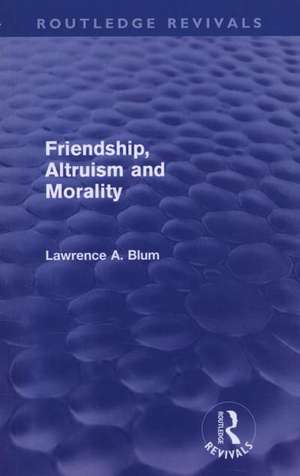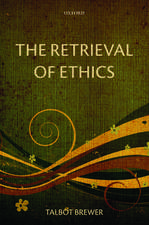Friendship, Altruism and Morality (Routledge Revivals): Routledge Revivals
Autor Laurence A. Blumen Limba Engleză Paperback – 18 dec 2009
| Toate formatele și edițiile | Preț | Express |
|---|---|---|
| Paperback (1) | 416.52 lei 6-8 săpt. | |
| Taylor & Francis – 18 dec 2009 | 416.52 lei 6-8 săpt. | |
| Hardback (1) | 822.91 lei 6-8 săpt. | |
| Taylor & Francis – 23 oct 2009 | 822.91 lei 6-8 săpt. |
Din seria Routledge Revivals
- 9%
 Preț: 801.69 lei
Preț: 801.69 lei - 8%
 Preț: 432.15 lei
Preț: 432.15 lei -
 Preț: 153.81 lei
Preț: 153.81 lei -
 Preț: 230.80 lei
Preț: 230.80 lei -
 Preț: 294.72 lei
Preț: 294.72 lei -
 Preț: 258.72 lei
Preț: 258.72 lei - 9%
 Preț: 764.34 lei
Preț: 764.34 lei - 9%
 Preț: 903.41 lei
Preț: 903.41 lei -
 Preț: 296.10 lei
Preț: 296.10 lei -
 Preț: 342.36 lei
Preț: 342.36 lei - 9%
 Preț: 606.35 lei
Preț: 606.35 lei -
 Preț: 317.54 lei
Preț: 317.54 lei - 9%
 Preț: 764.28 lei
Preț: 764.28 lei -
 Preț: 257.00 lei
Preț: 257.00 lei -
 Preț: 238.40 lei
Preț: 238.40 lei -
 Preț: 259.47 lei
Preț: 259.47 lei - 9%
 Preț: 903.80 lei
Preț: 903.80 lei -
 Preț: 326.26 lei
Preț: 326.26 lei -
 Preț: 258.66 lei
Preț: 258.66 lei -
 Preț: 294.97 lei
Preț: 294.97 lei -
 Preț: 308.89 lei
Preț: 308.89 lei -
 Preț: 199.85 lei
Preț: 199.85 lei -
 Preț: 347.49 lei
Preț: 347.49 lei -
 Preț: 295.04 lei
Preț: 295.04 lei -
 Preț: 389.39 lei
Preț: 389.39 lei -
 Preț: 257.00 lei
Preț: 257.00 lei -
 Preț: 343.21 lei
Preț: 343.21 lei - 9%
 Preț: 640.90 lei
Preț: 640.90 lei - 9%
 Preț: 619.48 lei
Preț: 619.48 lei -
 Preț: 228.88 lei
Preț: 228.88 lei -
 Preț: 257.67 lei
Preț: 257.67 lei -
 Preț: 245.10 lei
Preț: 245.10 lei -
 Preț: 258.52 lei
Preț: 258.52 lei -
 Preț: 258.72 lei
Preț: 258.72 lei -
 Preț: 368.93 lei
Preț: 368.93 lei -
 Preț: 246.37 lei
Preț: 246.37 lei - 9%
 Preț: 832.07 lei
Preț: 832.07 lei -
 Preț: 258.66 lei
Preț: 258.66 lei -
 Preț: 286.98 lei
Preț: 286.98 lei - 18%
 Preț: 695.85 lei
Preț: 695.85 lei - 9%
 Preț: 934.94 lei
Preț: 934.94 lei - 5%
 Preț: 231.22 lei
Preț: 231.22 lei -
 Preț: 267.15 lei
Preț: 267.15 lei -
 Preț: 200.66 lei
Preț: 200.66 lei - 9%
 Preț: 638.61 lei
Preț: 638.61 lei -
 Preț: 259.68 lei
Preț: 259.68 lei - 9%
 Preț: 1038.45 lei
Preț: 1038.45 lei -
 Preț: 389.43 lei
Preț: 389.43 lei -
 Preț: 302.13 lei
Preț: 302.13 lei -
 Preț: 302.25 lei
Preț: 302.25 lei
Preț: 416.52 lei
Nou
Puncte Express: 625
Preț estimativ în valută:
79.70€ • 83.44$ • 65.95£
79.70€ • 83.44$ • 65.95£
Carte tipărită la comandă
Livrare economică 05-19 aprilie
Preluare comenzi: 021 569.72.76
Specificații
ISBN-13: 9780415572927
ISBN-10: 0415572924
Pagini: 248
Dimensiuni: 138 x 216 x 13 mm
Greutate: 0.46 kg
Ediția:1
Editura: Taylor & Francis
Colecția Routledge
Seria Routledge Revivals
Locul publicării:Oxford, United Kingdom
ISBN-10: 0415572924
Pagini: 248
Dimensiuni: 138 x 216 x 13 mm
Greutate: 0.46 kg
Ediția:1
Editura: Taylor & Francis
Colecția Routledge
Seria Routledge Revivals
Locul publicării:Oxford, United Kingdom
Cuprins
1. Altruistic Emotions and the Kantian View 2. Altruistic Emotions as Moral Motivation 3. Friendship, Beneficience, and Impartiality 4. Friendship as a Moral Phenomenon 5. Direct Altruism, Universalizability, and Consistency 6. Altruistic Emotion, Reason, and Perception 7. The Intrinsic Value of Altruistic Emotions 8. Will, Emotion, and the self.
Recenzii
'It must be a rare honour for a new book in philosophy to be noticed in the news pages of The Sunday Times; Professor Blum’s book was hailed there, as marking a revolution in moral philosophy, shortly after its publication; and while it is, I think, rather less revolutionary than The Sunday Times believed, or than its author sometimes suggests, it deserves to be warmly welcomed and widely read.
The detailed argument of the book is impressive and interesting, and ought to persuade anyone who still needs persuading of the inadequacy of a strictly Kantian account …of morality as such. Blum shows himself to be more sensitive than many to the complex and varied realities of moral life and thought, and to the richness and subtlety of our moral concepts: for his aim is not to replace the Kantian account with an alternative general account of the essential and universal features of morality, but rather to exhibit the irreducible variety of moral thought and motivation.' - Philosphical Quarterly
'It displays well the strong reasons against treating human beings for moral purposes as simply incarnate intellects, and for taking seriously the contributions of our very complex affective life to our moral capacities.' - Mary Midgely, Encounter
The detailed argument of the book is impressive and interesting, and ought to persuade anyone who still needs persuading of the inadequacy of a strictly Kantian account …of morality as such. Blum shows himself to be more sensitive than many to the complex and varied realities of moral life and thought, and to the richness and subtlety of our moral concepts: for his aim is not to replace the Kantian account with an alternative general account of the essential and universal features of morality, but rather to exhibit the irreducible variety of moral thought and motivation.' - Philosphical Quarterly
'It displays well the strong reasons against treating human beings for moral purposes as simply incarnate intellects, and for taking seriously the contributions of our very complex affective life to our moral capacities.' - Mary Midgely, Encounter
Descriere
Friendship, Altruism, and Morality, originally published in 1980, gives an account of "altruistic emotions" (compassion, sympathy, concern) and friendship that brings out their moral value. Blum argues that moral theories centered on rationality, universal principle, obligation, and impersonality cannot capture this moral importance. This was one of the first books in contemporary moral philosophy to emphasize the moral significance of emotions, to deal with friendship as a moral phenomenon, and to challenge the rationalism of standard interpretations of Kant, although Blum’s "sentimentalism" owes more to Schopenhauer than to Hume. It was a forerunner to care ethics, and feminist ethics more generally; to virtue ethics; and to subsequent influential interpretations of Kant that attempted to room for altruistic emotion and friendship, and other forms of particularism and partialism. In addition, the work has been widely influential in religious studies, political theory, bioethics, and feminist ethics.
















